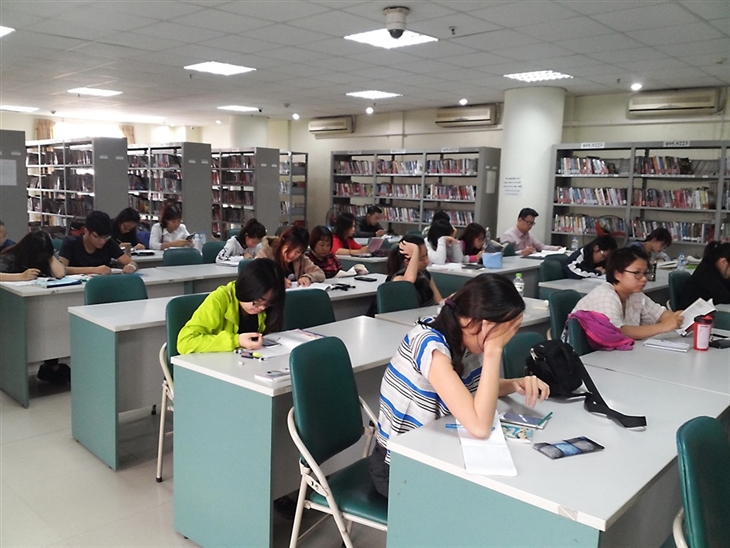Digital transforming program of library branches to 2025 with a vision to 2030
Monday, September 13,2021
AsemconnectVietnam - Applying strongly and comprehensively information technology, especially digital technology in order to improve operational capacity of libraries and form a modern library network; ensuring service provision to meet needs of users; attract a large number of people to pay attention to, use library services, contribute to improving people's knowledge and building a learning society.
I. Objectives
1. General goals
Applying strongly and comprehensively information technology, especially digital technology in order to improve operational capacity of libraries and form a modern library network; ensuring service provision to meet needs of users; attract a large number of people to pay attention to, use library services, contribute to improving people's knowledge and building a learning society.
2. Major objectives and orientation
a) Major targets to 2025
- 100% of public libraries have an important role and are prioritized for investment by the State together with the National Library of Vietnam, public libraries of provinces and centrally-run cities (hereinafter referred to as libraries with key role) perfecting and developing digital infrastructure, digital data, implementing integration, sharing resources and library information products according to functions, tasks, and cooperation documents.
- 100% of libraries have an important role, public libraries of centrally-affiliated cities and provinces, university libraries and specialized libraries at the central level have a website that provides online services with the open data component of the digitalized Vietnamese Knowledge System; 80% of other specialized and tertiary libraries, 60% of general education institutions, vocational education institutions and other educational institutions have websites capable of providing online services on a variety of accessible means (except for services subject to state secrets and limited reading services).
- 70% of ancient and rare documents and the collection of documents of special historical, cultural and scientific value collected and managed are digitized by libraries with an important role; 70% of endogenous documents, scientific research works collected and managed by specialized and university libraries are digitized.
- 100% of librarians are trained and retrained, updated with modern library operating knowledge and skills.
- 60% of libraries in the country or more are checked and managed through the information management system of the management agency.
b) Orientation to 2030
Continue to promote digital transformation, develop digital libraries, implement integration in all types of libraries, ensure efficient provision of services to library users anywhere, anytime.
II. Tasks and solutions
1. Awareness raising, communication enhancement
a) Raising awareness of leaders and librarians from central to local levels about the important role and requiring early implementation of the digital transformation of library branches in sync with the transformation of the number of cultural branches. , sports and tourism (museums, heritage, tourism ...) to build a digital ecosystem with deep and diverse contents, ways of organizing and exploiting resources and information products, utilities and services are plentiful and vivid, meeting the needs of all people in the digital economy and digital society.
b) Strengthen communication and dissemination of the digital transformation of the library branch through mass media and other forms, integrating it into related activities and events; attach importance to praising and honoring cases with many positive results in digital transformation to spread and multiply.
2. Completing mechanisms, policies and legal regulations
a) Review and complete the system of legal normative documents in the library to meet the requirement of digital transformation.
b) Coordinate in reviewing, developing new or proposing amendments and supplements to relevant legal documents and legal provisions to promote digital transformation, in which focusing policies on employees library cooperation and policies to encourage digital transformation in community libraries, private libraries that serve the community.
c) Develop and complete technical standards and regulations on libraries and apply information technology in libraries, digitize information resources, standardize metadata in digital libraries, and inter-connect, libraries, resource sharing, information products between domestic and foreign libraries.
d) Complete regulations on minimum conditions for modern technical and technological facilities, equipment and libraries for libraries that play an important role, ensuring active support and service of the digital transformation process.
dd) Having mechanisms and policies to attract organizations, enterprises and individuals to invest in developing libraries, digital ecosystems of culture, sports and tourism, including libraries; directly participate in building and perfecting the system of library resources and information products and performing digital transformation or providing digital transformation services in the library; encourage sponsorship and contributions, material donations as well as other conditions for the digital transformation of the library branch.
3. Complete and develop the digital infrastructure of the library industry
a) Gradually upgrade, complete and develop technical infrastructure (hardware infrastructure, software infrastructure) to meet the requirements of digital library services towards a modern and flexible network connection in real-time, digitizing information resources to serve interconnection, synchronization, consistency, suitability with the scale and characteristics of each type of library, soon forming e-libraries and digital libraries.
b) Libraries have an important role to be reviewed, upgraded, and restructured to accelerate the transformation, forming digital infrastructure, providing data, and connecting to our database, country, ministry, industry, and local in accordance with the law, which identifies the connected content in the library industry and the content connected with other industries, with a focus on safe and flexible management, Efficient data and resources, ensure safety, network security.
c) Increase investment in and upgrade smart library equipment and facilities on the basis of the application of modern information technology, especially libraries that play an important role.
d) Prioritize the implementation of the Program in the form of hiring, public-private partnerships related to the application and provision of information technology services for each specific task; assigning tasks, placing orders, and bidding comply with law.
4. Development of digital data for library industry
a) Focus on promoting projects to digitize documents and resources, library information products on the basis of new creation and integration with existing digital databases in an open direction, focusing on OER , inside:
- National Library of Vietnam and public libraries of centrally-affiliated cities and provinces: Prioritize digitization of geographic documents, ancient and rare documents, and collection of documents of special historical culture, science value.
- Specialized libraries: Prioritize the digitization of endogenous and rare documents, references, and documents with high usage demand.
- People's Armed Forces Libraries: Prioritize digitizing rare documents, documents on military, security, topics of revolutionary war ...
- University libraries and other educational institution libraries: Prioritize the digitization of references, materials, endogenous documents associated with the training program.
These digital data and resources, after being evaluated and evaluated by specialized agencies and organizations, will become an important part of the national digital resource, synchronously connected with the Vietnamese Digital Knowledge System, culture for sharing and use in order to spread and propagate culture, contributing to improving people's knowledge, material and spiritual life of the people.
Encourage community libraries, private libraries serving the community, organizations and individuals to participate in digitizing resources and library information products.
b) Form a system database identifying libraries, information agencies and services provided in libraries as well as on the internet. Support and promote cooperation to provide identity services for users; to build an online service delivery system and to make it widely available to all people, with a distinction of specific subjects.
c) Develop a combined index of contents reflecting shared documents and a table of contents associated with a number of sectors and fields; strengthen thematic information services, renew library information services towards providing information and knowledge upon request.
d) Diversifying library services using digital resources and digital information products applying artificial intelligence.
5. Build and develop digital platforms
a) Building, integrating, connecting, connecting, sharing databases, exchanging digital information resources between national and foreign libraries; cooperate in adding, sharing, sharing databases or accessing digital information resources.
b) To manage the library systematically so that the management agencies can inspect and manage.
c) Providing online services (introducing new information resources, searching information resources, borrowing / returning information, renewing information resources, remote copying ...) supporting learning and research and entertainment for the people.
Coordination between the library and post office in service development and support of information resource borrowing / return charges.
d) Develop applications on smart mobile devices (mobile phones, tablets, etc.) to provide services and the library's ability to access information resources everytime, everywhere.
dd) Build open data for people, communities, businesses, community libraries, private libraries to join the community, contribute to building an open data ecosystem of libraries and networks. National library information, contribute to building smart cities and building a learning society.
6. Ensuring network safety and security
a) Implement solutions to ensure network safety and security; information security management and monitoring; data security, ensuring backup and recovery mechanisms for servers, workstations, and related terminals.
b) Organize forces to respond to incidents to safety and network security.
c) Building digital infrastructure, platforms, digital data to ensure reliable, safe and healthy information; develop foundation systems, infrastructures and networks in association with ensuring network safety and security, being able to self-screen, detect malicious attack, and protect at a basic level.
7. Developing and improving the quality of human resources
a) Renovating programs, forms and promoting training, retraining and retraining to raise awareness, qualifications and skills of digital transformation for administrators and librarians; fully compiled books, manuals, fostering with rich content and form, easy to grasp and update.
b) Mobilizing the participation of human resources of enterprises and organizations in the process of transforming the number of library branches.
8. Promote international cooperation
a) Enlist the help of advanced countries and international organizations and enterprises in the development of information technology infrastructure, digital infrastructure, science and technology transfer, information resources as well as training and retraining of human resources and scientific research in the library.
b) Learning from the experiences of countries with thriving libraries and developing library numbers.
III. Funding for implementation
Funding for implementation includes: State budget; investment sources, sponsorships from businesses, organizations, individuals, communities and other lawful funding sources, in which:
1. The State budget shall comply with the regulations on budget decentralization, which enhances integration with the approved projects, programs and plans. The ministries, branches and localities shall, based on their assigned functions and tasks, actively arrange funding for implementation.
2. To mobilize domestic and foreign enterprises, organizations, individuals and communities to jointly invest in and finance funding for research, technology application and digital transformation of the library branch.
3. Other legitimate funding sources.
IV. Organization of implementation
1. The Ministry of Culture, Sports and Tourism
a) Take charge of developing specific plans and programs to organize the implementation of the Program.
b) To assume the prime responsibility for elaborating, amending, promulgating or submitting to competent authorities for promulgation legal documents promoting the digital transformation of the library branch; coordinate with ministries and agencies in formulating, completing and promulgating relevant legal documents.
c) Take charge according to the functions, duties and authority to develop and implement projects in the Appendix attached to the Program.
d) Take charge or cooperate in organizing training and retraining to improve the quality of human resources to meet the requirement of changing the number of library branches.
e) Organize the annual inspection, supervision and evaluation, and report to the Prime Minister; organize preliminary review by 2025 and summarize by 2030; propose to the Prime Minister to adjust and supplement the program's contents in case of necessity.
g) To promulgate or submit to competent agencies for promulgation national standards and national technical regulations in library operations.
2. Ministry of Finance
To assume the prime responsibility for, and coordinate with the Ministry of Culture, Sports and Tourism and concerned ministries and branches in, allocating regular funds for the program implementation according to regulations, in accordance with the ability to balance the state budget in the country each phase.
3. Ministry of Planning and Investment
a / To guide ministries, branches and localities in formulating medium-term plans for public investment capital to implement the Program.
b) Synthesize needs, advise and submit to competent authorities the balance and allocation of development investment capital to implement the Program according to the current budget decentralization based on the suggestions of the Ministry of Culture, Sports and Tourism.
c) Promote, attract and efficiently use resources from abroad and international partners for research, application, innovation, technology transfer, and digital transformation, library activities.
4. Ministry of Defense, Ministry of Public Security
a) To assume the prime responsibility for, and coordinate with the Ministry of Culture, Sports and Tourism in, promoting research and digital transformation at libraries under its management.
b) Building a digital library system, linking and sharing information resources throughout the library system, ensuring the specific elements of the armed forces.
5. Ministry of Education and Training, Ministry of Labor - Invalids and Social Affairs
a) To assume the prime responsibility for, and coordinate with the Ministry of Culture, Sports and Tourism in, renovating specialized library information training programs for library human resource development at the undergraduate and postgraduate level.
b) Develop new training codes and update professional human resource training programs at universities and vocational training institutions with contents related to library information.
c) Direct educational institutions and vocational training institutions to promote the construction and development of shared OER resources.
d) Develop and issue standards to modernize and standardize libraries in educational institutions and vocational education institutions.
6. Ministry of Science and Technology
a) To assume the prime responsibility for, and coordinate with the Ministry of Culture, Sports and Tourism in, amending and supplementing regulations on protection of intellectual property online to promote the digital transformation of the library branch; publish national standards on digital transformation activities, and appraise national technical regulations related to digital libraries and libraries.
b) Developing shared scientific and technological information resources for libraries; support and implement scientific tasks related to library activities and digital transformation in the library.
7. Ministry of Information and Communication
a) Develop and supplement national technical standards and regulations on digital technology application and development, new relationships in the digital transformation process in general and digital transformation in the library industry in particular. .
b) Deploy the development of a National Network Information System Assurance Program, including libraries.
8. Ministries, ministerial equivalent bodies and Government bodies
a) Investing and perfecting library standards play an important role.
b) To work out plans to implement digital transformation programs in libraries of ministries and branches, in association with information technology application, e-government and digital government development programs.
c) Coordinate with the Ministry of Culture, Sports and Tourism in implementing digitalization projects and developing specialized digital resources.
d) Organize the annual inspection, supervision and assessment, send reports to the Ministry of Culture, Sports and Tourism for synthesis and report to the Prime Minister.
9. People's Committees of provinces and centrally run cities
a) Investing and perfecting library standards play an important role; direct the units under the local management authority to allocate funds and implement the tasks of the Program according to regulations.
b) Based on the Program's objectives, contents and solutions, the People's Committees of provinces and centrally-run cities develop programs and plans for implementation in the locality, linked to the transfer programs. Change numbers in library activities with e-government building, local digital government.
c) Organize the annual inspection, supervision and assessment, send reports to the Ministry of Culture, Sports and Tourism for synthesis and reporting to the Prime Minister.\
L. Giang
Source: Vitic/ thuvienphapluat.vn
Program on conservation and development of Vietnamese craft villages in a period of 2021 - 2030
Implementation plan of marine aquaculture development project in Ninh Binh province to 2030 with a vision to 2045
Plan on implementing national environmental protection strategy to 2030 with a vision to 2050 in Kien Giang province
Plan on implementing Decision No. 327/QD-TTG dated March 10, 2022 of the Prime Minister approving the project on developing sustainable and effective wood processing industry in the period of 2021-2030 in Gia Lai province
Action plan on implementing strategy of sustainable agricultural and rural development in a period of 2022-2030 with a vision to 2050 in Hanoi city
Plan on implementing Decision No.923/QD-TTG dated August 2, 2022 of the Prime Minister approving science and technology program for new rural construction in a period of 2021-2025 in Vinh Long province
Plan on implementing strategy of sustainable agricultural and rural development in Bac Kan province in a period of 2021 - 2030 with a vision to 2050
Action plan on implementing livestock development strategy in a period of 2022-2030 with a vision to 2045 in Hanoi city
Implementation plan of Vietnam's forestry development strategy for a period of 2021-2030 with a vision to 2050 in Gia Lai province
National master plan in a period of 2021-2030, vision to 2050
Program on strengthening environmental protection, food safety and rural clean water supply in building new countryside in a period of 2021-2025
Digital transformation program on building new countryside, towards smart new countryside in a period of 2021 - 2025
Rural tourism development program on new rural construction in a period of 2021 - 2025
Project on development of trade, e-commerce systems and border trade in Binh Phuoc province in a period of 2021-2025, orientation to 2030

Plan on implementing Decision No. 327/QD-TTG dated March ...
Concretize viewpoints, objectives, tasks and solutions of the plan in accordance with practical conditions of the locality, associating ...Plan on implementing national environmental protection ...
Implementation plan of marine aquaculture development ...
Program on conservation and development of Vietnamese ...
Plan on improving quality of human resources to 2025 and ...

Efforts taken to turn culinary culture into national ...
The Vietnam Cuisine Culture Association (VCCA) is taking steps to implement a project to build and develop Vietnamese culinary culture ...Vietnamese cuisine making a name for itself with ...
Vietnam advance to next round of AFC U20 Women’s Asian Cup
Cultural tourism and traditional values promoted through ...



